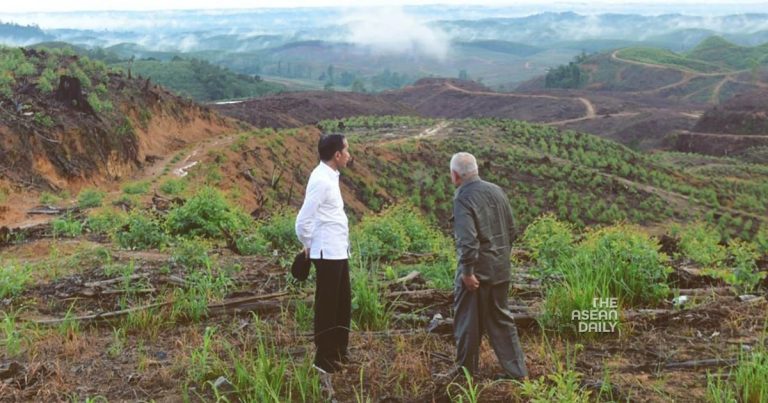17-8-2023 (JAKARTA) With a grand vision of a sprawling city inspired by the mythological bird Garuda from Indonesia’s emblem, the planned new capital of Nusantara is gearing up for a transformative shift. However, as the one-year countdown to the government’s relocation to the new city in 2024 begins today (August 17), the emblematic Garuda has yet to take flight, and construction challenges persist.
The ambitious Nusantara project envisions a vast four-storey palace, intended to symbolize the soaring Garuda, set in a lush expanse of 256,000 hectares – a landmass approximately four times the size of Jakarta and three times larger than Singapore. Yet, the pace of construction has left the highest building in the complex, the presidential palace, only about 20 per cent complete.
In response to this time-sensitive situation, an army of thousands of construction labourers toils ceaselessly to meet deadlines for the palace’s completion and other essential structures. The ongoing construction frenzy, is evident as trucks laden with materials navigate freshly paved roads leading to various construction sites within the Kalimantan forests that embrace Nusantara.
The construction fervor has given rise to dust-covered foliage, a testament to the extensive construction activities in what is heralded as a “green and smart city.” While doubts linger over the attainment of the August 17, 2024 move date and the potential disruption to Independence Day celebrations at the Garuda-inspired palace, local officials project unwavering confidence in the project’s trajectory.
Mr Bambang Susantono, the head of the Nusantara Capital Authority, conveyed a steadfast commitment to the Independence Day event in 2024, asserting that “the president and a few invitees will celebrate (Indonesia’s independence day) there.” He emphasized Nusantara’s ethos of inclusivity, environmental consciousness, and smart urban planning.
The Nusantara initiative, set to cost an estimated US$32 billion (approximately S$43 billion), represents a significant endeavor aimed at alleviating the congestion and subsidence plaguing Jakarta while fostering development in Kalimantan and eastern Indonesia. The project is designed to be executed in five stages. The inaugural phase encompasses the construction of the presidential palace, various ministries, roads, and housing, slated for completion by 2024. The final phase, set to coincide with Indonesia’s centennial in 2045, envisions comprehensive connectivity between Nusantara and neighboring cities such as Balikpapan and Samarinda.
The Ministry of Public Works and Housing, entrusted with overseeing Nusantara’s construction, reports that the first phase is roughly 38 per cent complete. However, various challenges, including supply chain disruptions and adverse weather conditions, have contributed to the project’s complexity. Mr Danis Sumadilaga, who spearheads Nusantara’s infrastructure development task force, elaborated on these hurdles, acknowledging the need for innovative solutions.
Nonetheless, Nusantara’s trajectory is also shadowed by a distinct set of challenges. Illegal mining operations, rampant in resource-rich eastern Kalimantan, pose a critical environmental concern. These unauthorized activities, particularly coal mining, are predominantly situated within Nusantara’s outer perimeters. Regrettably, such mining activities have led to numerous accidents, resulting in fatalities.
Although Nusantara was conceived as an environmentally conscious city with more than 75 per cent of its allocated area designated as green space, non-governmental organizations have highlighted the paradox of rampant illegal mining in these regions. The Mining Advocacy Network JATAM highlighted the presence of over 160 illegal mining sites in East Kalimantan, nearly 70 of which are in the vicinity of Nusantara. The implications of this practice extend beyond environmental degradation to disruptions in local economies.
Efforts to address this issue are in motion, as Mr Achmad Jaka Santos Adiwijaya, secretary of the new capital Nusantara, affirmed the intention to confront illegal mining through rigorous law enforcement. However, the persistence of illegal mining, intertwined with issues of power and influence, poses a considerable challenge.
A parallel concern revolves around securing investments for the Nusantara project. Currently funded through the state budget, the endeavor is actively seeking private investments. Despite some non-disclosure agreements (NDAs) being signed with potential investors, no firm commitments have materialized yet. The complex political landscape and upcoming elections contribute to uncertainties that deter potential investors.
As Indonesia’s aspirations converge with challenges, Jakarta-based economist Bhima Yudhistira acknowledged the role of political uncertainty in stifling investments. Yudhistira highlighted the need for coordinated efforts between institutions to bolster investor confidence, while the Secretary of Nusantara, Mr Adiwijaya, alluded to ongoing negotiations with several companies.
In a climate marked by cautious optimism, stakeholders anticipate the realization of this audacious vision. Residents, such as Mdm Herawati from Jakarta, expressed their eagerness to witness Nusantara’s development firsthand, while her daughter-in-law Susanti harbored optimism that the evolving structures would indeed be ready as envisaged.




